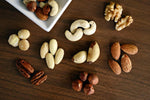
Vegetarian Foods Rich in Creatine: Best Plant-Based Alternatives
, by Sandesh Prasannakumar, 8 min reading time
Stay tuned, Your Favourite supplements will be back in stock soon!
Stay tuned, Your Favourite supplements will be back in stock soon!
Stay tuned, Your Favourite supplements will be back in stock soon!
Stay tuned, Your Favourite supplements will be back in stock soon!
Stay tuned, Your Favourite supplements will be back in stock soon!
Stay tuned, Your Favourite supplements will be back in stock soon!
Stay tuned, Your Favourite supplements will be back in stock soon!
Stay tuned, Your Favourite supplements will be back in stock soon!
Stay tuned, Your Favourite supplements will be back in stock soon!
Stay tuned, Your Favourite supplements will be back in stock soon!

, by Sandesh Prasannakumar, 8 min reading time
Creatine is the most commonly used supplement by individuals in physically demanding activities such as bodybuilding and athletics to enhance muscle mass and strength. It is found in animal-based foods that vegetarians and vegans bar in their diets. Nevertheless, there are many plant-based foods high in creatine that are safe for vegetarians and vegans.
Creatine is a molecule that is synthesised in the human body to deliver energy to the cells, especially the muscular tissues. It contains high-energy phosphate groups capable of donating phosphates to ADP so as to generate more ATP.
The extra ATP gives muscles the energy to perform rapid, powerful contractions during weight lifting, sprinting and other explosive actions. Creatine is a nitrogenous organic acid that is found in every human cell in varying concentrations. However, approximately 95% of total body creatine is in skeletal muscles.
Creatine is a natural compound that has been the focus of numerous contents and debates in the fitness industry, and here we are presenting why vegetarians need creatine.
Any individuals following plant-based diets do not stand the risk of suffering from creatine deficiencies. The liver, pancreas, and kidneys manufacture approximately 1–2 grams of creatine daily, and this is sufficiently sufficient for vegetarians.
But if athletes want muscle weight and power, creatine may still be absorbed adequately to meet their needs. These findings imply that supplementing enables vegetarians to realise creatine concentrations similar to those among nonvegetarians.
While meat and fish are highest in creatine, many vegetarian foods also provide modest amounts:
Tofu, tempeh, edamame, soy milk and soy protein powders contain reasonable amounts of creatine. They also contain complete proteins, making them ideal for vegetarians and vegans, especially bodybuilders.
They found that in a 100-gram sampling of firm tofu, there are about 0.1 grams of creatine. Soy milk, soybeans, soy yoghurt, and soy protein isolates contain 0.1g of sugars/100g also.
Creatine in nuts and seeds: Nuts and seeds, in general, are known to contain creatine in some measure; most of them have it in small proportions. Those richest in creatine per serving are: Those richest in creatine per serving are:
Trail mixes and nut butter can enable vegetarians to add more nuts and seeds to their meals covertly. However, do not go overboard with high-calorie content.
Beans and lentils offer decent plant-based protein and small amounts of creatine:
Try using beans as veggie burger patties, mixed with soup or salad, or mashed and incorporated in dips and desserts such as brownies.
While refined grains contain negligible amounts of creatine, minimally processed whole grains retain modest quantities:
Replace white rice, bread, and pasta with 100% whole grain as often as possible.
The fact is all fruits and all vegetables contain at least minimum creatine. Those highest per 100 grams include:
However, just eating fruits and vegetables does not give you large amounts of creatine, but when augmented with other plant sources, you can get significant amounts during the day.
Creatine is not off limits to any vegetarian out there; thus, they do not have to worry about not taking creatine. A lot of tasty plant foods can provide valuable amounts. Make soy products, nuts, seeds, beans, lentils, whole grain products, bananas and broccoli your main staples. Use as a supplement if further enhancement of muscular strength and performance is desired.
For the best quality creatine and other health supplements, visit Genetic Nutrition!
Likely not. If vegetarians are taking their daily food in the right proportions and with variety, then their body is capable of producing enough creatine everyday. However, athletes who would like to enhance their performance should continue using supplements.
Among plant sources, soy foods such as soy protein powders, tofu, and tempeh are the highest. Approximately 0.3 grams is found in a half-cup serving of soybeans or 100 grams of soy protein isolate powder.
Some creatine supplements are produced with the use of gelatin and other binders that are of animal origin and, hence not suitable for vegetarians. However, there are vegan friendly creatine products which are derived from plant starches or cellulose. Always check ingredient labels.
Creatine does not seem to be missing in the diets of vegetarians in a way that can be considered a deficiency. However, they are known to have lower muscle creatine content in comparison to non-vegetarians. The performance of athletes on plant-based diets is likely to be negatively affected by sub-optimal creatine stores.